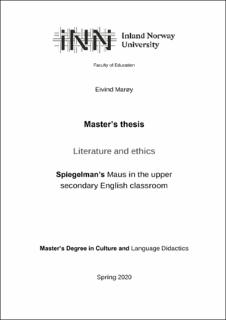Literature and ethics. Spiegelman’s Maus in the upper secondary English classroom.
Master thesis

Åpne
Permanent lenke
https://hdl.handle.net/11250/2680945Utgivelsesdato
2020Metadata
Vis full innførselSammendrag
English:
The core curriculum emphasizes the importance of critical thinking and ethical awareness. The overall aim of this thesis is to discuss how one can use literature to explore issues of ethics in the English language classroom. More specifically, I examine how Art Spiegelman’s graphic novel Maus can be used to discuss questions of ethics. I also discuss how working on ethics through literature can promote critical thinking skills and personal growth.
Two research methods are used in this thesis: a literature review and a close reading of Maus. I investigate how a methods-based approach with emphasis on moral reasoning can be used to discuss questions of ethics. Further, I explore the connection between ethics and literature, and review the didactical implications of working in this way. The close reading of Maus exemplifies the possibilities of ethical discussion within the graphic novel
My findings suggest that discussing questions of ethics can develop students’ critical thinking skills. The use of literature can promote students’ affective responses, which can make this process more effective. Ethics is about how we live with other people, and literature can be a way to help students to consider points of view that are unfamiliar to their own. To discuss questions such as these can make students more conscious about how they position themselves in a world filled with other people.
This thesis is based on theory and can mainly suggest possibilities for classroom application. Further research would entail interviewing students and teachers about their experiences of working on literature and ethics in this way. Norsk:
Den generelle delen av læreplanen vektlegg viktigheita av kritisk tenking og etisk bevisstheit. Det overordna målet med den denne oppgåva er å drøfte korleis ein kan bruke litteratur for å utforske etiske spørsmål i engelskfaget. Meir spesifikt vil eg utforske korleis Art Speigelman sin teikneserieroman Maus kan brukast til å diskutere etiske spørsmål i skulen. Eg drøftar også korleis det å jobbe med etikk gjennom litteratur kan fremme kritisk tenking og personleg utvikling
Denne oppgåva baserer seg på eit teorikapittel og ei nærlesing av Maus. Eg undersøker deretter korleis ei tilnærming med hovudfokus på etisk argumentasjon kan bli brukt i skulen. Vidare studerer eg relasjonen mellom etikk og litteratur og ser på dei didaktiske implikasjonane denne symbiosen bær med seg. Nærlesinga av Maus vil først og fremst vise dei ulike moglegheitene for etisk diskusjon som ligg i verket.
Resultata antydar at det å diskutere etiske spørsmål kan utvikle elevar si evne for kritisk tenking. Bruken av litteratur som utgangspunkt for etiske refleksjonar kan påverke elevar sine affektive reaksjonar, noko som kan gjere denne prosessen meir effektiv. Etikk handlar om korleis vi samhandlar med andre menneske, og litteratur kan vere ein god måte for elevar å sjå ting frå andre perspektiv enn sitt eige. Å diskutere slike spørsmål kan gjere elevar meir bevisste på korleis dei ter seg i ei verd der dei ikkje er åleine.
Denne oppgåva tar ei teoretisk tilnærming, og kan hovudsakleg foreslå didaktiske moglegheiter. Vidare forsking bør derfor innebere å snakke med elevar og lærarar om deira erfaringar med å studere etiske spørsmål gjennom bruk av litteratur i engelskfaget.
Beskrivelse
Mastergradsoppgave i kultur- og språkfagenes didaktikk, Høgskolen i Innlandet, 2020.